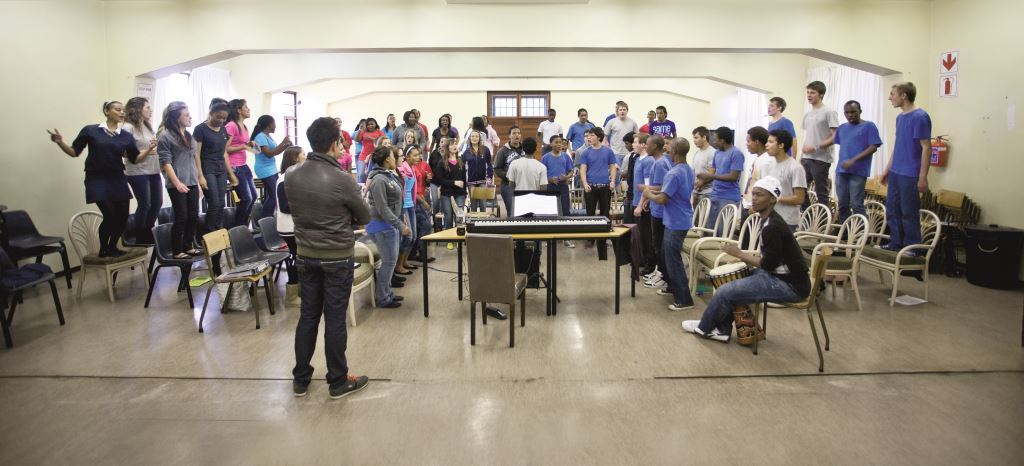One of the sweetest sounds of reconciliation in a troubled land could soon fade.
Eighty-four teenagers, from all walks of life, with one common denominator: a love for music. This is the South African Youth Choir (SAYC), made up of youngsters between the ages of 13 and 18 who embody the rainbow nation through song. Most of them come from disadvantaged backgrounds, most have little but their voices—all sing in harmony with choristers of all creeds and color.

“These children make Madiba’s dream a reality,” says SAYC events coordinator Anél King, using former president Nelson Mandela’s clan name, the man whose vision it was to create a peaceful, multi-cultural, non-racist South Africa. In many ways, this choir is that.
Since its launch in 2004, SAYC’s musical director, André van der Merwe, has been touring the country every October in search of new talent, visiting cities, small towns, townships and villages. Competition is tough. From several hundred teenagers who audition, between 20 and 25 are selected.
Loading...
“I look for a good voice and good ears, but also for personality, charisma, energy and resilience,” Van der Merwe says.
At a recent concert in Cape Town, Van der Merwe told the audience: “This is the real South Africa, not the one you read about in the papers.”
Most choir members come to live in a hostel in Durbanville, 25 kilometers outside of Cape Town, where they receive not only musical education—training in pop, rock, jazz and classical music—but also free accommodation, meals and tuition at the nearby high school.
“It’s much more than a choral group. It’s an upliftment program for disadvantaged youth,” say Cecile and James Horne, a retired teacher couple who run the hostel and see themselves as the ‘parents of the choir’.
“We practically offer them a new life.”

The teenagers confirm this. “Being in the choir has opened a whole new world to me. For the first time in my life, I feel I have options,” says Teboho Mashiya, a 15-year-old chorister who grew up in rural Phuthaditjhaba in South Africa’s Free State.
Mashiya and his peers belong to what South Africans like to call the “free generation”: those born after apartheid. But as the country’s democracy comes of age, South Africa’s youth continue to face a difficult future due to poor education, high unemployment and persistent poverty combined with the slow recovery of the economy from the global financial crisis.
The SAYC wants to be a place where talented youths find hope and opportunity.
“We teach them tolerance and social skills so that they become responsible, confident, well-balanced young adults,” says James Horne.
The recipe seems to work: since its inception eight years ago, all choir members have passed their high school exams, most with good enough grades to secure a university bursary. Many have moved on to careers in music, human sciences or business.
But for the current SAYC members, the dream of a better future might get a rude awakening. A streak of bad luck with sponsors, worsened by the economic downturn, has seen the choral group run out of funds. The first sponsor was the ill-fated financial management firm, Fidentia, which folded in 2007. For almost a year, the choir lived on a shoestring budget, surviving on once-off donations from individuals and small businesses.
The situation brightened at the end of that year when a Cape Town firm, Steeledale Reinforcing, came to the choir’s aid, sponsoring a year’s costs and a trip to Canada’s Kathaumixw Choral Competition, where the SAYC won first place in several categories. A year later, national oil company PetroSA took over, funding the group for another three years. But since then, money has dried up and the SAYC faces closure.
“After PetroSA didn’t renew funding, it’s been bleak. We have applied to other institutions, but so far, nothing has come through,” says SAYC chair André de la Harpe.
“Our coffers are empty. Soon we will have to close down. It’s a harsh reality that would destroy the children’s future.”
The choir, which has performed with singers like Katherine Jenkins and Sibongile Khumalo, is trying to make money by offering lessons in piano, voice and music theory as well as regular concert performances and CD sales. But income from these efforts is a drop in the ocean, says De la Harpe. Basic running costs are pegged at about half a million dollars or $580 per month per child. Ensuring long-term sustainability over four years at full budget would require $4 million.

Until now, the commitment from those involved with the choir has been remarkable. The entire staff—from the conductor to the hostel parents, cooks and cleaners—has been working without pay since the beginning of March. Rent for the hostel is in arrears. So are school fees. As the rumor of the choir’s potential closure spread through the hostel, the children went into shock, says Cecile Horne.
“It’s like a sword hanging over their heads,” she says.
Tears well in the eyes of Chanté Petersen, who joined the choir in Grade 8 and will graduate from high school this year. The 18-year-old, whose parents are unemployed, knows only too well that her chances of making it out of Elsies River, the poverty-stricken, crime-ridden township she grew up in, are slim if she returns without a matric certificate.
“The choir means everything to me,” she says.
For others, like 17-year-old Daniel Meaker from Pretoria, the future doesn’t look much brighter. “Money is pretty tight at home. I am very worried about the choir disbanding. I don’t know what I’d do,” he says.
For now, all will sing for their supper.
Loading...
